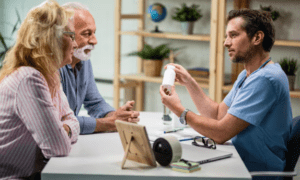Technology has emerged as a new way of life. No one can live without technology because we have surrounded ourselves with the use of technological gadgets. As it was developed for the benefits and welfare of humanity, we are entirely addicted to and dependent on it.
Although we witness many contributions of technology in various fields of life, for instance, technology has changed our education system, climate control, project management, etc. But the lifesaving change it has is on the health.
When various diseases and people impacted the world population was losing hope because of losing their loved ones, technology revived the world all over again.
Technological gadgets for healthcare, including skincare, are best to use. You need to buy one for yourself, too. You can shop online and for secure delivery, use the tracking services speedpak tracking system.
5 Key Roles Of Tech In Health Care:
The role of technology is inevitable, and no one can deny its importance. From lowering the death ratio of diseases to replicating an organ of the body, technology has changed the health industry’s face.
Here are five key roles that technology has played in healthcare.
-
Telehealth:
Telehealth is comprised of two words, health, and telecommunication. Telehealth is an advance and present-day diagnosis and treatment method where telecom devices are used for medical purposes.
Telehealth or telemedicine is essential and famous for a few reasons. Firstly, it is the best option for places where access to hospitals or health services is lacking, such as rural areas. The second reason is the substantial benefits of low costs.
-
Electronic Health Records:
Electronic Health Records (EHR) is the most significant evolution in the history of medical science. It facilitates countless medical diagnostics and treatments.
The past was horrible because hospitals were equipped with disparate information systems clumpy and could not transfer patient records on time.
On the contrary, the arrival of EHR has changed the game, and it has connected many systems allowing the transfer of patient information quickly and efficiently.
-
Remote Monitoring:
In the past, it was impossible for a patient living in one country to get treated by a doctor in another country but by visiting those miles for treatment. It was the past. The present is different, and the future is yet unpredictable.
With remote monitoring tools, you have the freedom to connect to a doctor a thousand miles away from the comfort of your home. This advancement has cut unnecessary visits to your doctor, costing you extra effort and money.
-
Genome Sequencing:
Genome sequencing is nearly the future of healthcare and is one of the advancements in medical technology. Genome sequencing is the analysis and sequencing of the genome of an individual and giving them genomic information. With that said, genome sequencing is also referred to as Personal genomics.
Dr. Francis Collins, director of the National Institutes of Health, had called genome sequencing crossing a bridge in most medical science advancements.
-
Wearable Technology:
Assessment and monitoring of the patient is a demanding and necessary step in healthcare. With the invention of wearable technology, doctors can easily track your health. Wearable devices collect data about your health, such as your heartbeat rate, blood pressure, etc., to help your doctor diagnose your health condition.
Wearable technology, including wristbands and watches, will make room for you to take care of your health yourself and stay yourself away from visiting doctors over and over. So, you become independent and alert about your health.
The Bottom Line:
Technology has positive as well as negative sides. It depends on the individual in charge to decide whether to use it for a good cause or counterpart. However, the benefits of technology are tremendous.
Research suggests that telehealth ICU discharged 20% more patients with a 26% lower mortality rate than a traditional ICU.

































